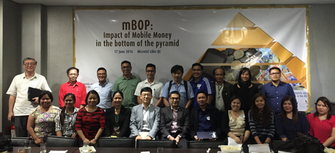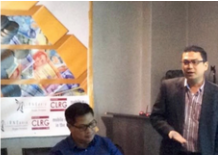Impact of Mobile Financial Services in low- low-middle income countries
17 June 2016
m-Money Systematic Review
The dissemination event for the m-Money Systematic review was held on June 17, 2016 at the Microtel Libis in Quezon City, Philippines.
The systematic review team was headed by Erwin A. Alampay, Senior Research Fellow at LirneAsia and currently Director of the Center for Local and Regional Governance (CLRG). Other members of the team included Dr. Goodiel Moshi, Ms. Ishita Ghosh, Ms. Juliana Harshanti, and Ms. Mina Peralta.
According to Dr. Alampay, of the 2759 studies they looked at, only ten studies fulfilled the rigorous standards for inclusion in the review. All ten were studies in Africa, with 6 coming from Kenya, where their model, m-Pesa, is well known.
Among the findings in the systematic review were the significantly higher volumes of remittances received among m-financial service users compared to non-users. It also found that m-money as an intervention leads to greater (although not statistically significant difference) savings.
In cases where m-money has been used for cash transfers in farm inputs, m-money has been found to be significantly responsible for a 54% increase in farm inputs consumption compared to non-users. This has also contributed to an increase in household income and farm yield sold.
Dr. Alampay also shared that some studies involved cash transfer programs. Since many in the audience had cash transfer programs, some of them shared their experience in using technologies, such as e-cards and m-money, for their cash transfer programs. Among those who presented were from the DSWD and Oxfam.
The project was carried out with the aid of a grant from the International Development Research Centre of Canada, and the Department for International Development UK.
m-Money for cash transfers in the Philippines
Given that many in the discussion came from government and non-governmental organizations that have cash delivery programs, Dr. Alampay also took advantage of the occasion to disseminate his recently published research on “m-Money as Conduit for Conditional Cash Transfers in the Philippines.” The paper came out in the journal Information Technology and International Development (Summer 2016). This research was funded by the Institute for Money, Technology and Financial Inclusion, and was among the best papers selected from the CPRSouth conference held in Maropeng, South Africa.
Full report in PDF can be downloaded below.
m-Money Systematic Review
The dissemination event for the m-Money Systematic review was held on June 17, 2016 at the Microtel Libis in Quezon City, Philippines.
The systematic review team was headed by Erwin A. Alampay, Senior Research Fellow at LirneAsia and currently Director of the Center for Local and Regional Governance (CLRG). Other members of the team included Dr. Goodiel Moshi, Ms. Ishita Ghosh, Ms. Juliana Harshanti, and Ms. Mina Peralta.
According to Dr. Alampay, of the 2759 studies they looked at, only ten studies fulfilled the rigorous standards for inclusion in the review. All ten were studies in Africa, with 6 coming from Kenya, where their model, m-Pesa, is well known.
Among the findings in the systematic review were the significantly higher volumes of remittances received among m-financial service users compared to non-users. It also found that m-money as an intervention leads to greater (although not statistically significant difference) savings.
In cases where m-money has been used for cash transfers in farm inputs, m-money has been found to be significantly responsible for a 54% increase in farm inputs consumption compared to non-users. This has also contributed to an increase in household income and farm yield sold.
Dr. Alampay also shared that some studies involved cash transfer programs. Since many in the audience had cash transfer programs, some of them shared their experience in using technologies, such as e-cards and m-money, for their cash transfer programs. Among those who presented were from the DSWD and Oxfam.
The project was carried out with the aid of a grant from the International Development Research Centre of Canada, and the Department for International Development UK.
m-Money for cash transfers in the Philippines
Given that many in the discussion came from government and non-governmental organizations that have cash delivery programs, Dr. Alampay also took advantage of the occasion to disseminate his recently published research on “m-Money as Conduit for Conditional Cash Transfers in the Philippines.” The paper came out in the journal Information Technology and International Development (Summer 2016). This research was funded by the Institute for Money, Technology and Financial Inclusion, and was among the best papers selected from the CPRSouth conference held in Maropeng, South Africa.
Full report in PDF can be downloaded below.
| mBoP Report | |
| File Size: | 2078 kb |
| File Type: | |
More CLRG News.


